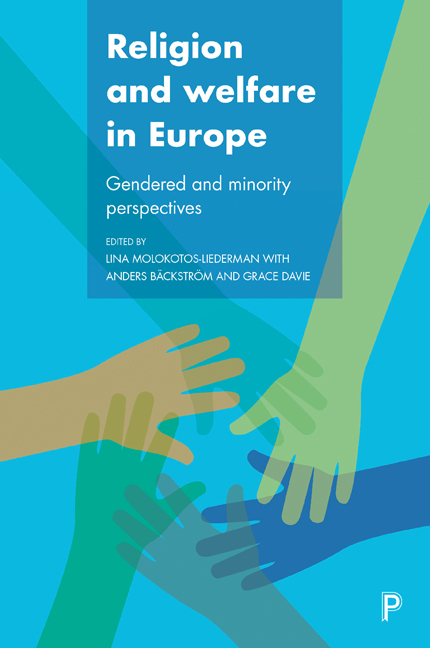Book contents
- Frontmatter
- Contents
- List of tables, figures and maps
- Acknowledgements
- Notes on contributors
- one Introduction
- Part One Thinking methodologically: approaches to research and practice
- Part Two Thinking regionally: key case studies in welfare and religion in Europe
- Part Three Gendered and minority perspectives
- Part Four Drawing the threads together
- Appendix: the WaVE team
- Index
Eight - Understanding religious minority communities as civil society actors
Published online by Cambridge University Press: 05 April 2022
- Frontmatter
- Contents
- List of tables, figures and maps
- Acknowledgements
- Notes on contributors
- one Introduction
- Part One Thinking methodologically: approaches to research and practice
- Part Two Thinking regionally: key case studies in welfare and religion in Europe
- Part Three Gendered and minority perspectives
- Part Four Drawing the threads together
- Appendix: the WaVE team
- Index
Summary
Introduction
Is religion part of civil society? Most sociologists of religion would reply in the affirmative, not least since José Casanova questioned the hypothesis that growing modernisation, secularisation, differentiation and individualisation lead to the shrinking importance of religion in the public sphere (Casanova, 1994). However, in social science research on civil society, the religious perspective has remained marginal for a long time. In German and Swedish textbooks on civil society, religion and religious organisations are often covered in a short chapter or in a few pages, even if the authors are experts in the field of religion (see, for example, Adloff, 2005; Wijkström, 2012; Zimmer and Simsa, 2014). At the same time, religious diversity has grown on account of increasing waves of migration, and globalisation has revitalised debates on the role of religion and religious organisations in civil society in Europe. This is mirrored by an increasing number of publications and research projects in the field (De Hart et al, 2013; Baumann, 2014; Nagel, 2015).
It would be interesting to examine changes in the discourses on the role of religion and religious organisations in civil society over the past 10 years and to follow how research questions and arguments have evolved. The aim of this chapter, however, is rather more modest. Using as a starting point the research landscape outlined very briefly in the previous paragraph, this chapter examines what a local case study on the contribution of religious minority communities to social welfare can say about the role of religion and religious organisations in civil society. It draws in particular on the German case study in the Welfare and Values in Europe: Transitions Related to Religion, Minorities and Gender (WaVE) project, which explored relations between minority and majority in European societies through the prism of welfare (Leis- Peters and Albert, 2012).
Against this background, the first part of the chapter introduces recent studies on religion and civil society. The second part explains the setting and background of the German case study. The third part presents a particular example, a Turkish association, within the German WaVE case study, while the fourth and final part discusses the implications of these data against the background of the studies on religion and civil society presented in the first part of the chapter.
- Type
- Chapter
- Information
- Religion and Welfare in EuropeGendered and Minority Perspectives, pp. 163 - 184Publisher: Bristol University PressPrint publication year: 2017



